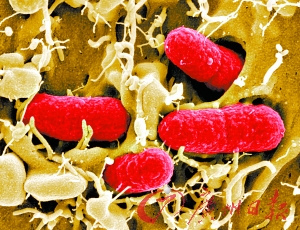摘要:在线的新英格兰医学期刊(New England Journal of Medicine,)刊登一条信息,分别来自海德堡、蒙特利尔和巴黎的医生和科学家成功治疗3个溶血性尿毒症患者,这些患者是感染出血性大肠杆菌的儿童。在德国,出血性大肠杆菌已致700多人感染,其中10名患者已经死亡。

出血性大肠杆菌
In the online version of the New England Journal of Medicine, physicians and scientists in Heidelberg, Montreal, and Paris reported on the successful treatment of three young children who were suffering from a severe hemolytic-uremic syndrome (HUS) after an infection with enterohemorrhagic
Escherichia coli (EHEC). The infections occurred in 2010. EHEC are the bacteria that cause the current wave of infections that have already claimed ten lives in Germany. The number of suspected and confirmed cases of EHEC has now reached 700.
Eculizumab has been approved in Germany since 2007 and is used to treat a rare blood disease and a rare congenital form of HUS. Two years ago,
American physicians reported similar success in children with this form of HUS (NEJM 2009; 360:544-546).
The children suffered from kidney failure and severe neurological disorders. "After several exchanges of blood plasma had no effect, we decided to attempt treatment with Eculizumab," reports Professor Dr. Franz Schaefer, head of the section of Pediatric Nephrology at the Center for Child and Adolescent Medicine at Heidelberg University Hospital.
Within 24 hours of the initial infusion, which was repeated once or twice at intervals of seven days, the clinical condition of the children improved dramatically. Dialysis due to acute kidney failure from HUS could be discontinued. All three children recovered and had no sequelae even six months after the illness.
The researchers decided on using the monoclonal antibody Eculizumab as it interrupts the destructive immune reactions that occur after an infection with EHEC. Eculizumab binds to protein C5, which activates what is called the complement cascade and lead to the destruction of blood cells among other things. With EHEC infections there can also be complement activation, triggered by the Shiga toxin formed by the bacteria.
"We now hope that these results will help the acutely ill patients," said Professor Schaefer. He assumes that even adult patients can profit from therapy with the antibody. "Because of the epidemic in Germany, the publishers of the New England Journal of Medicine decided to accelerate the publishing date of the article, which they have had since February, and they published it immediately after reviewing it," said Schaefer. In addition, the article was sent to all kidney specialists in Germany.
Meanwhile, first treatments of adults and children in German hospitals have started. The German Society of Nephrologists has issued guidelines that the antibody may be given if all others standard treatments like dialysis and plasmapheresis have failed.







